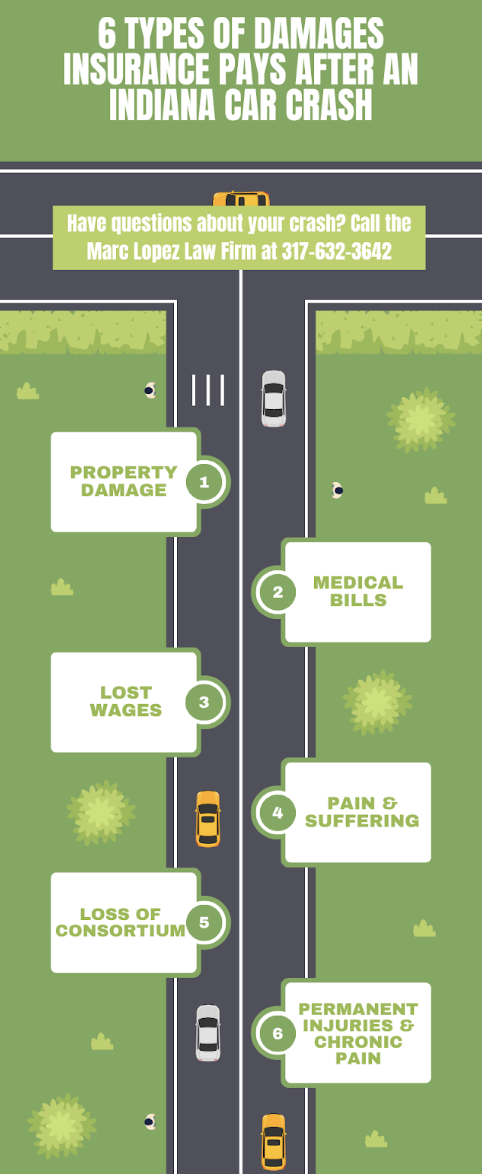If you’ve been in a car crash in Indiana, you’re probably overwhelmed. Medical bills are piling up. Your car might be totaled. And the insurance adjuster is offering numbers that don’t quite make sense.
Here’s the truth: insurance companies aren’t on your side. Their job is to protect their bottom line, not your recovery. But when you understand what damages they are required to pay, you’re in a much better position to fight for the compensation you deserve.
Let’s break down the six types of damages insurance companies typically pay, and the one claim that almost never delivers.

The 6 Damages Insurance Companies Pay After an Indiana Car Crash
1. Property Damage
This is the first and often most straightforward part of your claim. Whether your vehicle is repairable or a total loss, the insurance company is obligated to compensate you.
- If your car can be repaired, you are owed the full cost of repairs.
- If it’s totaled, you are entitled to the fair market value of the vehicle, plus:
- Sales tax
- Title fees
- Registration costs
Don’t forget to include any damaged personal property inside the vehicle. Items like phones, laptops, eyeglasses, or even sentimental photos may be reimbursed under the property damage portion of your claim.
2. Medical Bills
From ER visits to physical therapy, every dollar you spend on injury-related treatment should be documented.
This can include:
- Hospital stays
- Doctor visits
- Over-the-counter supplies
- Chiropractic care
- Prescription medication
Save every receipt. You may have to reimburse your health insurance provider out of your settlement, so it is essential to track all expenses. In most cases, a person must have completed medical treatment before settlement negotiations can start.
3. Lost Wages
If the crash forced you to miss work, you can claim compensation for the income you lost.
Examples include:
- Missed paychecks
- Side gig earnings (such as delivery or freelance work)
- Vacation or sick days used to recover
- Missed job opportunities
If you can’t return to the same job, future lost wages may also be part of your claim. Pay stubs, tax returns, and app screenshots are all helpful in proving what you normally earn.
4. Pain and Suffering
The old rule of multiplying your medical bills by three is outdated. Today, pain and suffering is calculated based on:
- How severe your injuries are
- How long your treatment lasted
- How your day-to-day life has been affected
A sprain may lead to a modest recovery. Surgery and long-term limitations may increase the value of your case. Keeping a personal journal of your pain, emotional stress, and physical struggles can help support this claim.
5. Loss of Consortium
If the crash has negatively affected your marriage, your spouse may be able to file a loss of consortium claim. This can include:
- Reduced companionship or intimacy
- Emotional strain in the relationship
- Shifts in household responsibilities
Loss of consortium is not appropriate in every case, but when it applies, it can be a powerful addition to your claim.
6. Permanency and Disfigurement
If your injuries leave lasting damage, this can significantly impact your settlement value.
This includes:
- Visible scarring
- Limping or restricted movement
- Chronic pain or lifelong limitations
To support these claims, your attorney may rely on medical records, expert witness reports, or testimony from your doctors. These permanent conditions can increase the overall value of your case.
The One Claim Everyone Wants But Rarely Gets: Punitive Damages
Many people ask about punitive damages. While the idea of punishing the person who caused the crash may sound appealing, these damages are very rare in Indiana.
Punitive damages only apply when the at-fault driver acted intentionally or with extreme recklessness. Examples might include drunk driving or road rage.
Even if you qualify:
- Insurance typically does not cover punitive damages.
- A large portion of the money goes to the State of Indiana, not you.
Because of this, punitive damages are not something most crash victims should count on. If your case qualifies, your attorney will walk you through your options.
Don’t Leave Money on the Table
After a crash, it’s easy to feel like the insurance company holds all the cards. But when you understand what you’re entitled to, you’re in a much better position to stand up for yourself.
Here’s a quick recap of what insurers usually pay:
- Property damage
- Medical bills
- Lost wages
- Pain and suffering
- Loss of consortium (if applicable)
- Permanent injury or disfigurement
And what they almost never pay:
- Punitive damages
Maximize Your Claim With the Right Help
Too often, crash victims miss out on thousands of dollars because they didn’t know what to ask for or how to prove it. An experienced Indiana injury lawyer can help you navigate your claim and fight for what you’re truly owed.
At the Marc Lopez Law Firm, we help injured people across Indiana hold insurance companies accountable. We don’t get paid unless you do, and we’re just a phone call away.
Call 463-288-6270 today for a free consultation.
Let the Marc Lopez Law Firm turn your frustration into compensation.



